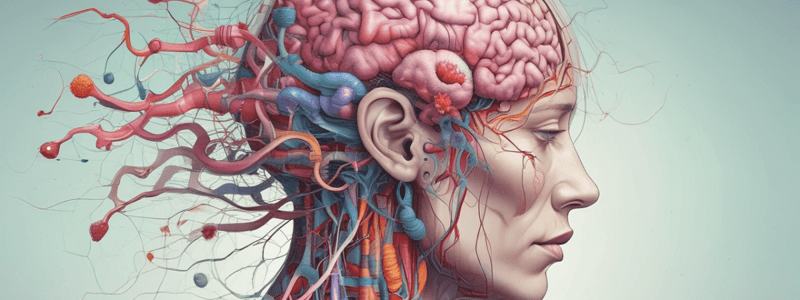Podcast
Questions and Answers
What is the primary mechanism by which infections cause CNS dysfunction?
What is the primary mechanism by which infections cause CNS dysfunction?
- Inflammation of the meninges and destruction of cranial nerves
- Vasculitis and thrombosis leading to brain infarcts
- Destruction of brain tissue and increased intracranial pressure (correct)
- Meningeal fibrosis and communicating hydrocephalus
What is the sensitivity of the classic triad of fever, stiff neck, and altered mental status for bacterial meningitis?
What is the sensitivity of the classic triad of fever, stiff neck, and altered mental status for bacterial meningitis?
- 70%
- 60%
- 80%
- 44% (correct)
What is the most common complication of performing an LP in the presence of a space-occupying lesion?
What is the most common complication of performing an LP in the presence of a space-occupying lesion?
- Meningitis
- Subarachnoid hemorrhage
- Brainstem herniation (correct)
- Cerebral edema
What is the typical duration of onset of bacterial meningitis in most patients?
What is the typical duration of onset of bacterial meningitis in most patients?
What is the primary indication for empiric antibiotic therapy in bacterial meningitis?
What is the primary indication for empiric antibiotic therapy in bacterial meningitis?
What is the characteristic CSF finding in fungal meningitis?
What is the characteristic CSF finding in fungal meningitis?
What is the primary role of CT scan in the evaluation of bacterial meningitis?
What is the primary role of CT scan in the evaluation of bacterial meningitis?
What is the mortality rate of bacterial meningitis without treatment?
What is the mortality rate of bacterial meningitis without treatment?
What is the primary causative organism of cryptococcosis?
What is the primary causative organism of cryptococcosis?
Which of the following is a characteristic of tubercular meningitis?
Which of the following is a characteristic of tubercular meningitis?
What is the most common cause of viral meningitis prior to the routine administration of MMR vaccines?
What is the most common cause of viral meningitis prior to the routine administration of MMR vaccines?
What is the primary treatment for HSV encephalitis?
What is the primary treatment for HSV encephalitis?
What is the most common pathogen isolated in brain abscesses that develop from a chronic otitis media?
What is the most common pathogen isolated in brain abscesses that develop from a chronic otitis media?
What is the primary reason for performing a CT scan without contrast in patients with suspected brain abscesses?
What is the primary reason for performing a CT scan without contrast in patients with suspected brain abscesses?
What is the primary cause of morbidity and mortality in pneumococcal meningitis?
What is the primary cause of morbidity and mortality in pneumococcal meningitis?
What is the characteristic of aseptic meningitis?
What is the characteristic of aseptic meningitis?
What is the recommended treatment for all patients with suspected encephalitis?
What is the recommended treatment for all patients with suspected encephalitis?
What is the percentage of brain abscesses that develop from a chronic otitis media?
What is the percentage of brain abscesses that develop from a chronic otitis media?
Flashcards are hidden until you start studying
Study Notes
Infections of the Central Nervous System (CNS)
- Infections of the CNS include meningitis, encephalitis, and brain abscesses.
- These infections cause CNS dysfunction by destroying brain tissue and increasing intracranial pressure.
Types of CNS Infections
- Meningitis: acute inflammation of the leptomeninges (pia and arachnoid mater) caused by microbial infection growing within the CSF.
- Encephalitis: inflammation of brain parenchyma.
- Brain Abscess: localized collection of pus within the brain parenchyma.
Acute Bacterial Meningitis
- Etiology:
- Neonates: Group B Strep, Listeria, enteric gram-negative rods.
- Children: S. pneumoniae, N. meningitidis, H. influenzae.
- Adults: S. pneumoniae, N. meningitidis.
- Clinical correlations:
- Classic triad of fever, stiff neck, and altered mental status has a low sensitivity (44%) for bacterial meningitis.
- Meningeal inflammation causes stiff neck, headache.
- "Toxins" cause brain swelling, increased ICP, herniation, encephalopathy, and seizures.
- Inflammation of cranial nerve causes nerve palsies.
- Vasculitis/Thrombosis causes brain infarcts.
- Meningeal fibrosis causes communicating hydrocephalus.
- Onset within 24 hours in ~90% of patients.
- Bacterial meningitis is a medical emergency with near 100% mortality without treatment.
Lumbar Puncture (LP)
- Performed between 3rd and 4th lumbar vertebra.
- CSF analysis in meningitis:
- Elevated pressure and turbidity indicate bacterial infection.
- Clear and normal pressure indicate viral infection.
- Fungal infection: clear and normal-elevated pressure.
Antibiotic Therapy
- Empiric antibiotic therapy: third-generation cephalosporin (e.g. ceftriaxone) and vancomycin.
- Start therapy immediately after collecting CSF vials.
- For adults with pneumococcal meningitis, dexamethasone 10 mg IV with the first dose of antibiotics and every 6 hours for 4 days decreases morbidity and mortality.
Subacute and Chronic Meningitis
- Presents with fever, headache, meningismus, and altered mental status similar to acute meningitis.
- More gradual onset over weeks to months.
- Organisms associated with subacute/chronic meningitis include mycobacteria (TB), fungi (cryptococcosis), and spirochetes (syphilis, Lyme disease); sarcoidosis can be chronic.
- An important cause of subacute or chronic meningitis is not-fully-treated acute meningitis.
Tubercular Meningitis
- Granulomatous inflammation, mainly involving the base of the brain.
- Brain infarcts from vessel involvement.
- Cranial nerve deficits from nerve damage.
- Meningeal fibrosis can cause hydrocephalus.
Cryptococcosis
- Caused by Cryptococcus neoformans, a spherical, budding yeast with a thick polysaccharide capsule.
- Present in soil, bird excreta.
- Common cause of infection in immunocompromised patients.
Aseptic Meningitis
- Caused principally by viruses, especially herpes simplex virus and enteroviruses.
- Has a more benign and self-limited course.
- Can occur with secondary syphilis and disseminated Lyme disease.
- Prior to the routine administration of MMR vaccines, mumps was the most common cause of viral meningitis.
- Drug-induced aseptic meningitis has been reported with NSAIDs, sulfonamides, and certain monoclonal antibodies.
Encephalitis
- HSV 1 encephalitis is the most common viral encephalitis.
- Very destructive, causing necrosis and hemorrhage in the brain, typically in the temporal lobe.
- HSV encephalitis requires effective treatment.
- Start all patients with suspected encephalitis on acyclovir.
- When started early, acyclovir has been shown to significantly decrease mortality and morbidity and limit long-term behavioral and cognitive impairment.
Brain Abscesses
- Presents as a space-occupying lesion.
- Symptoms may include vomiting, fever, altered mental status, or focal neurologic findings.
- CT without contrast scan of the brain should be performed.
- Bacteriology of brain abscess is usually polymicrobial and includes S. aureus, gram-negative bacilli, streptococci, and mouth anaerobes (MOUTH - dental care).
- 14-58% of cases develop from chronic otitis media.
- 55% form an abscess in the temporal lobe.
- Proteus mirabilis is the most common pathogen isolated in these brain abscesses.
- Can also develop after head trauma, systemic infection (pneumonia, endocarditis, tooth decay).
- Treatment: Surgery, I&D.
Studying That Suits You
Use AI to generate personalized quizzes and flashcards to suit your learning preferences.




